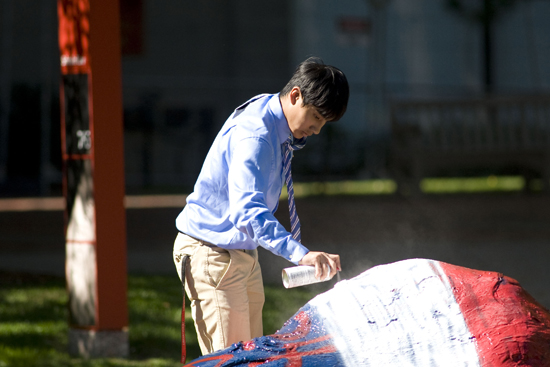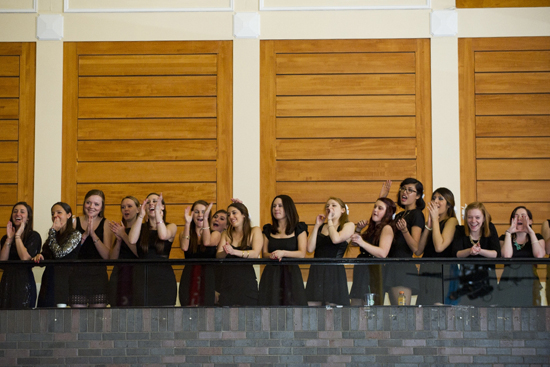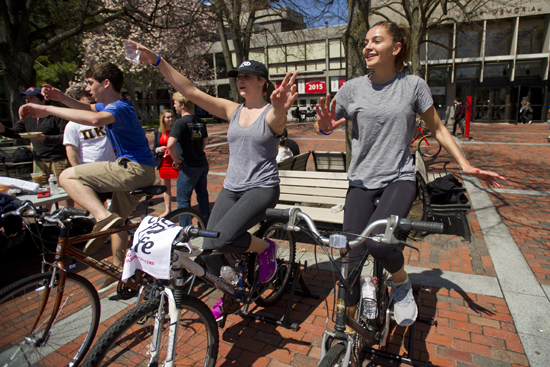This week is Greek Week at BU, and the Greeks on campus would like you to know that despite recent allegations of hazing and other misconduct, they do plenty to make the University proud. In the 2010–2011 academic year, the most recent year for which numbers are readily available, they raised more than $80,000 for charitable organizations. They also point out that fraternities and sororities offer a convenient way to make friends at a large university, and they provide opportunities to develop leadership qualities and to have some fun.
Brittany Hedenberg (SMG’14), president of the Panhellenic Council, says her three years as a Greek have taught her a great deal about leading and empowering others, useful skills in any career. Last month, she says, a University sorority teamed up with BU Student Government to offer a self-defense class as part of National Hazing Prevention Week, which brought speakers and educational outreach to campus. It was a positive effort, but one that also that begs the question: why do we have something called National Hazing Prevention Week?
Part of the answer is Greek life at many colleges and universities, including BU, has a history of bad behavior, often involving unhealthy amounts of alcohol. In the last year and a half alone, three incidents have seriously marred the reputation of Greek life at BU and have prompted the Dean of Students to halt any addition of Greek organizations to the Inter-Fraternity Council and the Panhellenic Council for the foreseeable future.
In March 2012, the sorority Sigma Delta Tau was temporarily suspended for an alleged case of alcohol-related hazing that also involved members of the unrecognized fraternity Alpha Epsilon Pi (AEPi). One month later, AEPi allegedly hazed five students. According to reports, police found the apparent pledges dressed only in their underwear standing in a basement, hands bound, red welts on their backs, and covered with various food ingredients.
In a far more tragic incident in March 2013, Anthony Barksdale II (ENG’16), a new member of the BU chapter of Sigma Alpha Mu (SAM), was pronounced dead after being transported from an Allston apartment where a SAM function had been held. The fraternity was suspended by Sigma Alpha Mu’s national leadership, based in Indianapolis, Ind., and by the University, following reports of underage drinking and severe intoxication at an unregistered off-campus fraternity event.

A brother paints the Greek Rock. Photo by BU Photography
Incidents like those have also, understandably, drawn the scrutiny of Inter-Fraternity Council president Thatcher Hoyt (SMG’14) and Hedenberg, who say they are taking a hard look at their membership processes. They cite safeguards such as a requirement imposed last October that student leaders in clubs and Greek life, as well as resident assistants and athletes, attend bystander training sessions run by the Sexual Assault Response & Prevention Center (SARP) and staff from the Dean of Students office. The two-hour sessions teach students to recognize the warning signs of excessive alcohol use and predatory behavior, and to intervene. They also point out that sorority Sigma Kappa sponsored this year’s National Hazing Prevention Week and that Greek Week includes the Every|Day Hero Campaign, with activities such as self-defense classes and lectures on the dangers of hazing.
The good and the bad of Greek life—the funds raised for charity and the potential dangers of hazing—have left Dean of Students Kenneth Elmore (SED’87) with a mixed opinion of the organizations. “These are a group of people who, in social organizations, do philanthropic work,” says Elmore, who was a member of Alpha Phi Alpha as a Brown University undergraduate. But Elmore warns that Greek life cannot “fall prey to violent acts or stupidity” again. “In the past we’ve met about alleged hazings and excessiveness issues,” he says. “I want to get together more often to talk about positive things.”
While he is eager to expand the dialogue with fraternities and sororities, Elmore says his office will “hold off on adding new organizations so that we can thoroughly look at them and make sure the people that are here continue to grow….We hope over time we have absolute confidence in our Greek letter organizations.”
The dean’s action will curtail a recent growth trend in Greek life on the Charles River Campus. Abby Myette, associate director of the Student Activities Office, says six new chapters have joined the University since fall 2009.

Sorority members at the Beauty and the Greek game show, held in Metcalf Ballroom this March. Photo by Cydney Scott
Ancient Greek life
Greek organizations appeared on the BU campus as early as the 1880s, and they thrived here for nearly a century. Seth Rosenzweig, a former BU Greek advisor, says interest in fraternities and sororities flagged in the 1960s, and the University’s Greek houses were sold, primarily to MIT, after a power struggle between BU and national headquarters of various Greek organizations. In the book Transformations: A History of Boston University, author Kathleen Kilgore says that between 1968 and 1972, BU’s Greek organizations had become inactive, but slowly returned six years later. In 1983, the Inter-Fraternity and Sorority Council was formed, but membership was far below its peak decades earlier.
Today, Kenmore Square and Bay State Road are populated, oddly, with MIT fraternity houses instead of BU’s. The lack of houses is said to be one reason that BU has fewer Greeks than many similar-sized universities. The website collegeprowler.com rated Greek life at BU a “B-,” reporting that student voters don’t view it as a big part of the school. Which is not to say that BU’s 10 fraternities and 10 sororities, whose membership currently attracts 13 percent of students, don’t play an important role in campus life. Each year they attract hundreds of non-Greeks to their dozens of social events, which include dating contests and trivia nights.
There are many reasons, other than allegations of hazing, that much of the 87 percent of students who don’t take part in Greek life have less than glowing opinions of its contribution to the University.
Students who spoke to us for this week’s “YouSpeak” complain that members of Greek organizations can be snobbish and are by definition exclusive. They say requirements like membership dues and frequent meetings can deter students who have less money and less time because they have to work. Some believe that Greek friendships are often superficial.
Kara Dillaway (CGS’14) says she has a problem with “the idea of paying for a group of friends.” Teresa Fulcher (ENG’15) complains about the social pressure of recruitment, saying the experience can build or break people. “People’s reasons for joining are different,” she says. “More so with sororities than fraternities, because girls get into cliques.”
Fraternity brothers and sorority sisters argue that members are no more or less snobbish than anyone else, although some acknowledge that, yes, rush can be very stressful. They prefer to talk about their many accomplishments, some of which they will celebrate this week. Those include the national recognition last year of BU’s chapter of Delta Lambda Phi, a fraternity for gay, bisexual, and progressive men. They point out that proceeds from the week’s events, which include a lip synch event and an adviser appreciation ceremony, support the Dream Street Foundation, which sends children with terminal or chronic illnesses to camp. It is one of more than 20 major charity events that Greek life participates in every year. In one night last March, the sorority Alpha Epsilon Phi (AEPhi) raised $4,600 for the Elizabeth Glaser Pediatric AIDS Foundation.

Greeks Dylan Smith (CAS’15) (from left), Zoe Gillespie (COM’14), and Selin Thomas (COM’14) ride stationary bikes for 30 minutes to raise money for the Pi Kappa Alpha philanthropy Taylor Trudeau Cycle for Life, which supports leukemia, lymphoma, and melanoma research. Photo by Cydney Scott
Hoyt also says the Inter-Fraternity Council is planning to make positive changes to its academic requirements, perhaps raising the minimum GPA that a chapter must maintain before it recommends that a member seek tutoring.
As president of the Panhellenic Council, Hedenberg is gearing up for sorority recruitment, which begins in January. She has already been approached by potential rushes, some of whom aren’t sure if they would fit into Greek life. When that happens, she says, she shares her own uncertainty. “As I went through recruitment, I realized being part of a sorority would be a great opportunity to meet new people,” she says. “Since BU is so big, I wanted something that could make it a lot smaller. Now I’m part of an organization with a large group of friends I’ll always count on.”
Hoyt, a member of Chi Phi and the BU Student Government vice president of internal affairs, says the Greek community is broadly misunderstood. “A lot of people can look at members of the Greek community as close-minded,” he says. “It’s funny, because Greek life at BU is the exact opposite. When we recruit for an organization, we’re really looking at someone’s personality, leadership qualities, and how well we all get along together. There are a lot of chapters, and there’s a chapter out there for all different people.”
















































Related Stories
Lost and Found: Eleonora Valdez, El Salvador
Greek life gives this international student a sense of community
Fourth Annual Giving Day Raises More Than $2.3 Million
Daylong event sets University fundraising record
New EPIC Studio Will Equip ENG Students with Design Skills
$18.8 million in-kind gift helps transform engineering curriculum
Post Your Comment